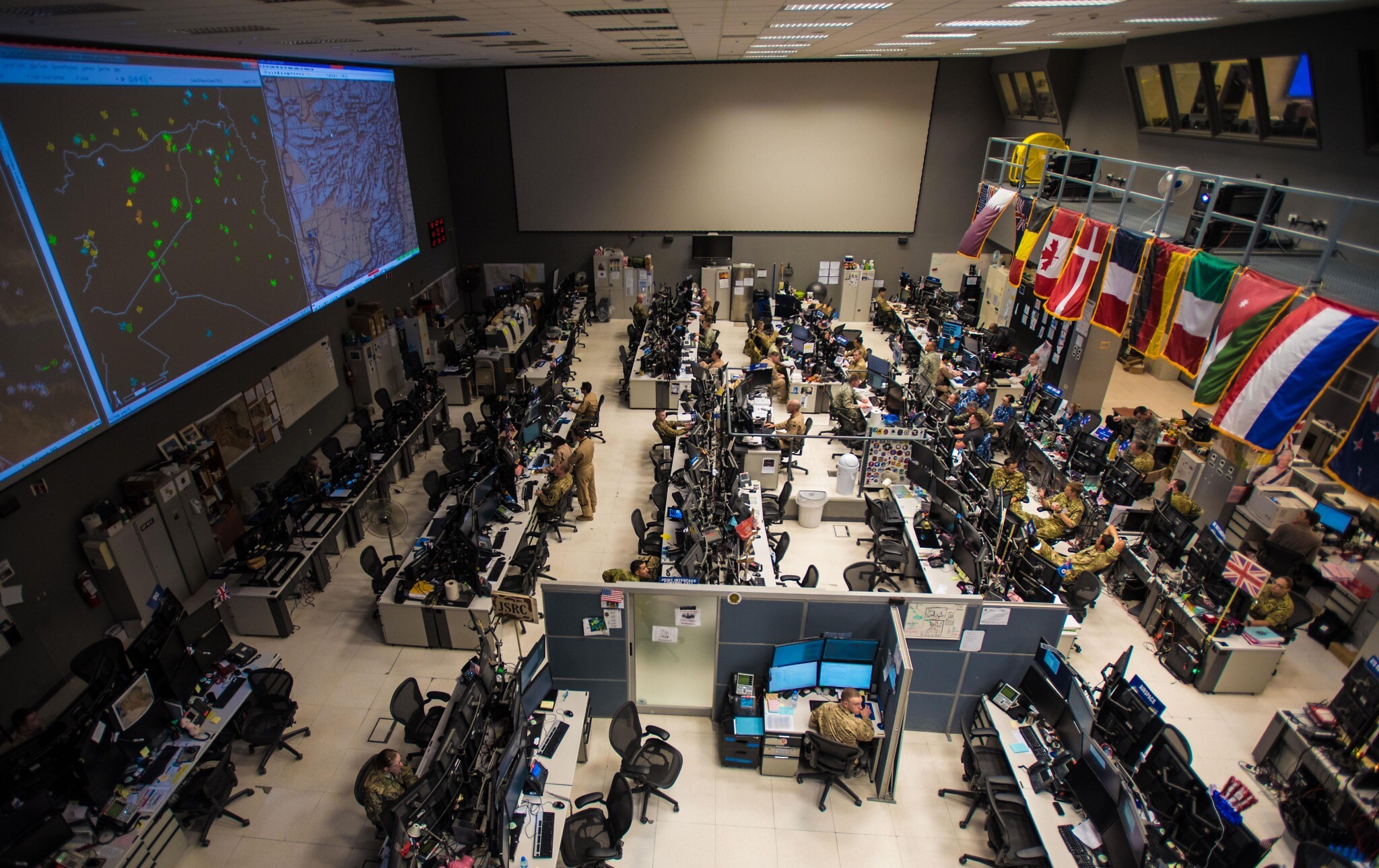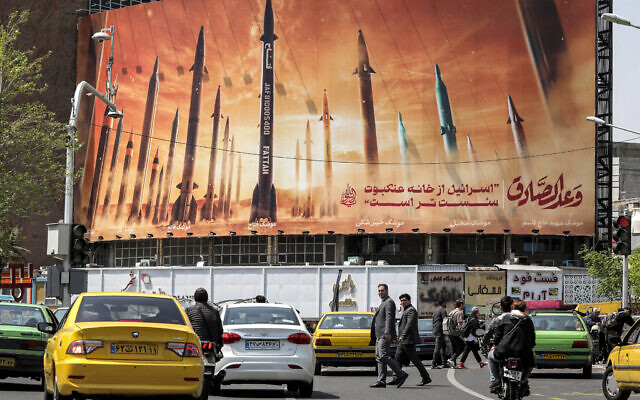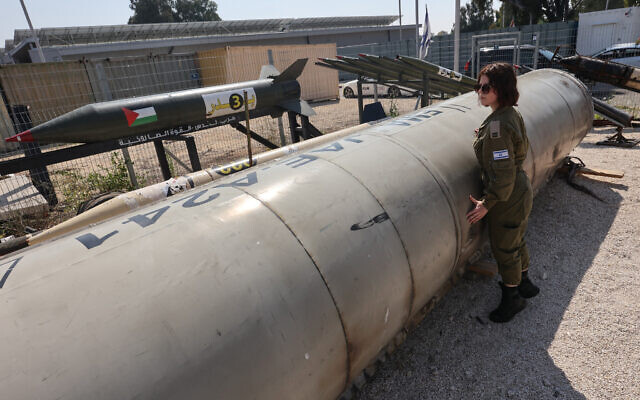



Israel has been hesitant to speak of the alliance that came together Saturday, bringing it together with the US, Jordan, Saudi Arabia, Egypt, the UAE and Qatar in a large joint war room to coordinate efforts against Iranian missiles and drones buzzing toward the Jewish state.
The inclusion of Qatar on the list may seem somewhat of a surprise, given that Doha is commonly associated with Israel’s enemies, including Iran and Hamas.
But they were the hosts.
The giant war room at the US’s Al Udeid Air Base near Doha is focused on providing an overall view of the region’s airspace and aerial power over an area of responsibility stretching from Kazakhstan to Egypt.
The center collects data from radars and sensors throughout the region and it was there that analysts managed to construct a picture of what the Iranian attack contained, with Israel getting details in real-time as if its officials were present in the room.
Speaking to Times of Israel sister site Zman Yisrael, a senior Israeli source described the cooperative effort as a real breakthrough, marking the first time that the regional alliance has operated against Iran. It wasn’t only the first time they operated openly; it was the first time they worked together against Iran at all.
True, the cooperative effort is being kept somewhat quiet, with the actions of Israel, the US, Jordan, Britain and France to shoot down the threat highlighted.
But behind the scenes, every member of the de facto partnership contributed, whether it was sharing radar feeds, or physically shooting down the more than 300 drones and missiles launched at Israel.
Due to the sensitivities of the information, we can’t say exactly who did what, but we can learn a lot about this new regional alliance.
The Wall Street Journal, which has become something of an unofficial regurgitator for Israeli information, reported that Saudi Arabia and Qatar received a heads up from Iran on the timing of the attack and reluctantly passed it on to Israel amid US pressure.
The report seems logical, but it’s doubtful the US needed to pressure Riyadh and Doha into passing on the information; it was in both their interests to do so, given the possible consequences had they not. Imagine what would have happened, for instance, if the US discovered they knew the details but had not issued a warning.
Jordan, which unhappily made headlines for its role in shooting down the projectiles and defending Israel, has come under attack from the Iranian media, with King Abdullah labeled a “traitor” in Tehran.
But Saudi Arabia seems to have escaped the ayatollahs’ wrath, even though no one is ignorant of the role it played. Riyadh did not bar the allies from using its airspace and did not stop the US radars based in its territory from building an aerial picture and aiding interceptions.
And Iran, which officially continues to hail the success of its strikes, knows very well that it may have shot itself in the foot. Rather than build upon the international isolation Israel is experiencing over the war in Gaza and thwarting a regional anti-Iran alliance backed by the West, Tehran managed to force the alliance into the open and give it a showcase for how effective US-led cooperation can be.
For Iran, then, any victory is pyrrhic at best. The Islamic Republic did manage to establish new rules of engagement for the Middle East, creating a calculus by which any attack on a senior official or sensitive site could spark a massive response, risking all-out war and giving Israel second thoughts. It also challenged the US by ignoring US President Joe Biden’s warnings of “don’t.”
Israel can be happy with these positive developments, but it also needs to look at the half-empty side of the glass: despite the success in foiling Iran’s attack, few politicians will count what occurred as a victory for Israel.
In the Middle East, deterrence is built by offense, not defense. Israel’s air defense systems, as successful as they are, give Israel’s leadership wider maneuverability, but the ability to shoot down missiles and drones should hardly be thought of as a major deterrent.
Israel’s government and population are largely in agreement about the need for an offensive operation in response. The rub will be in finding a way to carry it out without breaking apart the fragile structure of the new alliance and destroying the once-again warm relations with the US.
A pair of war cabinet meetings held within a day of each other shows the intensity of the deliberations in Israel. The buildup of tensions may be also part of the plan for Israel’s response, with Iranians nervously awaiting what retaliation may come, in a mirror image of Israel’s tension-filled wait for Iran’s promised “slap.”
Somewhat contradictory reports on the conversation between US President Joe Biden and Prime Minister Benjamin Netanyahu early Sunday point to the possibility that the Americans understand where Israel is coming from.
Some versions say that Biden said “no” to an Israeli military response, while other versions say he just requested that Israel consider, delay and soften the retaliatory move.
The dual messaging suggests that while the White House clearly does not want the type of Israeli response that could drag the whole region into war, it also gets that when facing Iran, something more is necessary.
It’s not only Iran waiting to see how Israel will react. So too are the members of the new alliance. And it’s not only Israel they are looking to, but the US as well.
Biden’s space for maneuvering is limited. He could buy quiet in the short term, but he cannot stay on the fence indefinitely.
At some stage, the US will have to take greater action against Iran if it wants to strengthen the alliance and be able to act decisively against Iran’s nuclear program. After this weekend’s attack, figuring out how to tackle Iran’s nuclear ambitions has become an even more urgent problem.
This article first appeared in Zman Yisrael, the Times of Israel’s Hebrew-language sister site.





